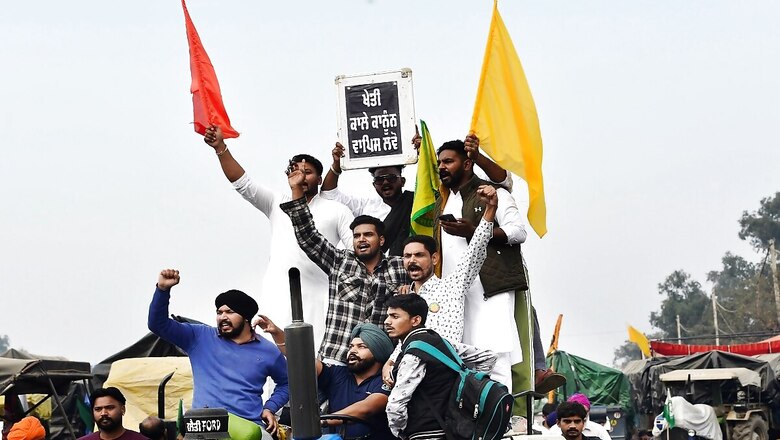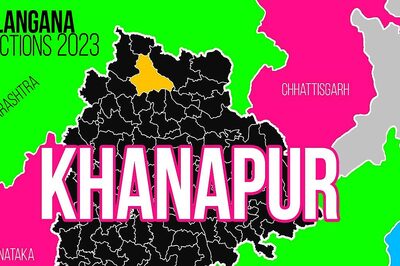
views
The conflict on the three farms laws has reached a stalemate. The Centre is unwilling to repeal the law and the agitating farmers from Punjab want nothing less. In such a situation, the only way forward is for the government to introduce an amendment that delegates the implementation and adaptation of the law to states.
The government has already assured that Minimum Support Price will continue. The government should introduce guaranteed MSP in the shape of an Act. The MSP is at the core of farmers’ demands, hence it should pave the way for reconciliation.
The implementation of farm reforms and adaptation as per the needs of the states should be left to the state governments. Punjab has already introduced laws to this effect and they are awaiting the Governors’ clearance. Agriculture is a state subject, hence it should be left to the state to adapt the laws as per their requirements.
Any other state, if it wants to adapt the law to fit its requirement, should be allowed to do so. Agriculture is not just a state subject; its dynamics are determined by agro-climatic zones, not just by state boundaries. A state can also be divided into agro zones according to the soil and weather conditions. We all have heard the saying ‘Chaar kos par paani, aur 40 kos par vaani’.
The National Agricultural Research project launched by the Indian Council of Agriculture Research (ICRA) divided the country in 127 agro-climatic zones. The objective of defining these 127 zones was to solve the problem locally based on natural resources, climate conditions, water availability, production constraints and socio-economic conditions prevalent in that zone.
If farmers in the Malwa region of Punjab have a specific problem and can only grow specific crops, then it is best left to the state government to address their concerns. It is time to rethink how within these three laws the central government can delegate more powers to the state to manage farmers and their interests better.
For instance, the storage requirements and entry of the corporate house has to be incentivised according to the requirement of the region. Unscrupulous elements cannot be given land or incentives for setting up warehouses if it does not serve the purpose of the farmers. The decision on setting up of these warehouses will be taken by district-level officers and they are the best judge of the needs of their area.
They need to be given adequate information and freedom to take a decision if the agriculture infrastructure has to be built keeping the producer in mind. If the producer is not kept in mind while framing these policies, it will serve nobody’s interest. They will not be commercially viable if they don’t fit into the supply chain properly. The supply chain comprises farmers at one end and consumers at the other end. The objective is that the farmers are able to understand what the end consumers want and they are able to shift their production to get higher realizations.
This should be the objective with which discussion should be carried forward. And the farmers need to trust that without a conversation, the issue is not going to move forward on its own. They have to prevent politicians from creating a stalemate or hijacking their campaign and driving their agenda.
The farmers’ agenda is a better price and sustainable agriculture. The next generation of farmers have much higher aspirations. They have to be met from agriculture, earnings have to go up, they cannot slip down. Hence, it is important that the focus is on adapting what is good in the current bills for the advantage of the farmers.
This adaptation can be done by the state governments as the income status of farmers is also not the same across the country. Farmers in Punjab have successfully increased their yield and farmers in other states are trying to do so. They are at different stages of development. Each state is different, each agro-climatic zone is different. The same laws will not be successful everywhere.
Even for contract farming, awareness and acceptance has to be gradually built up and it can only be done by the state government. It is important that there is trust between both the parties from day one; if there is lack of trust, then farmers will not sign up for any contract farming activities anywhere in the country. And the law will remain on paper without any implementation on the ground.
This is why the trust for creating a conducive environment between farmers and buyers has to be rebuilt by the state governments by laying down certain standards and parameters. The process of arbitration between farmers and buyers will be done at state or district level. Therefore, instead of the central government dictating all the parameters as a law, they should limit it to a suggestion and the states should be able to change and adapt it to their requirement.
The central government has already delegated procurement to certain states. Now the next stage of reforms is to delegate intra-state distribution. This is good for states that have a high surplus of grains and higher number of people below the poverty line as they need more food grains under the Targeted Public distribution system (TPDS). And they can procure and distribute within their own state.
Centralized procurement and distribution from the central pool or sending grains from surplus state to deficient state is reducing and will continue to come down to the precarious fiscal position of the central government. The government can create competition by delegating intra-state distribution to bilateral arrangement between states instead of interfering in the market and distorting it against the interest of the farmers.
The amendment should not be just in introducing corporates as a competition to the state, but also allow competition between the states for both procurement and distribution. The farmers and central government need to keep an open mind for the future of 55% of the population of the country that is dependent. Short-term thinking will affect the aspirations and growth of the economy. Neither the state government nor the central governments can afford it in these uncertain times. The farmers issue can be resolved if freedom to the state is given and the farmers understand its importance.
Read all the Latest News, Breaking News and Coronavirus News here




















Comments
0 comment